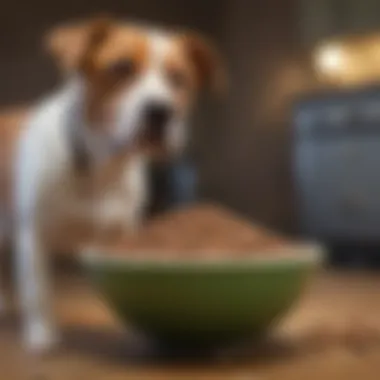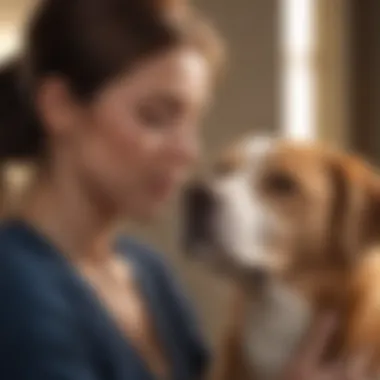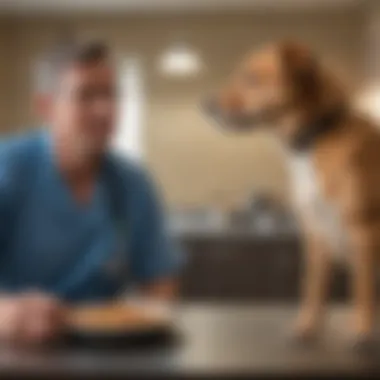Understanding Your Dog's Loss of Appetite After Diarrhea


Intro
When a dog experiences diarrhea, pet owners often face a challenging situation, especially when their beloved companion refuses to eat afterward. Understanding the underlying reasons for this behavior is crucial for ensuring optimal recovery and health. Many factors contribute to a dog’s reluctance to eat after diarrhea, including physical discomfort, emotional stress, and dietary issues.
This article delves into the complexities of canine behavior following gastrointestinal distress. By examining physiological responses and emotional factors, pet owners can better support their pets' recovery and health. The goal is to inform pet owners about practical strategies to manage this difficult period, making sure their dogs receive appropriate care and nutrition.
Understanding Your Pet
Dogs, like humans, have different responses to physical distress. When faced with diarrhea, their natural instinct may lead them to abstain from food. Recognizing this behavior requires a nuanced understanding of your pet's unique traits and needs.
Breed Traits
Different breeds may show varying sensitivities towards illnesses. Smaller breeds often exhibit stronger reactions to dietary changes and stressful situations. Conversely, larger breeds may have more resiliency, but they can also face serious health issues. Understanding these traits helps in anticipating how your dog might respond post-diarrhea.
Common Temperaments
Temperament plays an integral role in how dogs respond to health challenges. A nervous dog may react to diarrhea with increased stress, leading to a reluctance to eat. In contrast, a more assertive breed may continue to seek food despite discomfort. Addressing emotional health is just as important as managing physical symptoms.
Special Needs
Some dogs, particularly those with pre-existing health conditions or sensitivities, require special attention when recovering from diarrhea. Identifying these needs early on can be essential in implementing the right dietary adjustments or seeking medical advice.
Pet Care Essentials
After an episode of diarrhea, ensuring that your dog receives appropriate care is paramount. This includes focusing on nutrition, grooming, and overall wellness.
Nutrition and Feeding Guidelines
Proper nutrition is key in aiding recovery. After diarrhea, it may be beneficial to provide easily digestible foods such as boiled chicken and rice. Gradually reintroducing regular dog food is crucial, and portion sizes should be adjusted based on your dog’s comfort. It's also advisable to consult with a veterinarian before making significant dietary changes.
Grooming Tips and Techniques
While grooming may not directly impact recovery from diarrhea, maintaining your dog’s hygiene can help prevent further issues. Regular baths and coat care ensure your pet feels comfortable and clean, contributing to their overall well-being.
Health and Wellness
Monitoring health is vital post-diarrhea. Pay attention to signs of dehydration and watch for other symptoms that may indicate a more serious condition. Timely veterinary consultations can ensure that your pet receives proper diagnostics and treatment if necessary.
Training and Behavior
Behavioral aspects of a dog may also shift during recovery. House training and behavioral management play significant roles in overall pet care.
Basic Training Techniques
Reinforcing basic commands can help maintain a structured environment for your pet, providing comfort during stressful times. Fearful behavior can be mitigated with positive reinforcement strategies.
Behavioral Problems and Solutions
If a dog continues to refuse food, gradual desensitization to feeding routines may help. Offering meals in a quiet and calming atmosphere can ease anxiety related to eating.
Mental Stimulation Activities
Engaging your dog mentally can distract from physical discomfort and help ease the recovery process. Simple games or puzzles can keep their mind active without overstimulating their digestive system.
Engaging with Your Pet
Social interaction is essential for a dog's emotional recovery, particularly after an episode of illness.
Interactive Games and Toys
Providing interactive toys can encourage play and make meal times more engaging. These distractions can help in slowly reintroducing food without added stress.


Safe Outdoor Activities
Once your dog shows signs of improvement, gentle walks can be a great way to uplift their mood. Observe their energy level, ensuring that activities are light and suitable.
Family-Friendly Pet Interactions
Involving the entire family in caring for the pet can strengthen bonds. A calm, supportive environment will be beneficial for the pet's recovery.
Pet Adoption and Integration
For new pet owners dealing with a similar scenario, understanding health backgrounds before adoption can be advantageous. Choosing an appropriate pet for your lifestyle sets a strong foundation.
Choosing the Right Pet for Your Lifestyle
Select a breed and individual temperament that matches your lifestyle needs. A dog prone to digestive issues may not be ideal for a busy, frequently traveling owner.
Preparing Your Home for a New Pet
Proper preparation of your home ensures a smooth transition and reduces stress for the new pet. A stable, comfortable environment is essential for any dog’s well-being.
Tips for Smooth Prologue
Introduce new pets gradually and ensure they are acclimatized to the new surroundings. A gentle approach fosters a sense of security, which can prevent stress-related issues, including dietary refusals.
In summary, understanding why your dog won’t eat after diarrhea requires careful observation and consideration of multiple factors—from breed traits to emotional well-being. Addressing each aspect methodically will aid owners in supporting their dogs through recovery.
Foreword
Dogs are cherished companions, and observing changes in their behavior, especially regarding eating habits, can be worrisome for any pet owner. After a bout of diarrhea, it is not uncommon for dogs to display a sudden reluctance to eat. Understanding this phenomenon is crucial for ensuring the overall health and well-being of your pet. This article delves into the various factors that influence your dog's appetite following episodes of digestive distress.
Diarrhea can have multiple underlying causes, some of which may require urgent attention. For pet owners, identifying why their dog won't eat after such an incident can help delineate between a temporary phase and a more serious health concern.
Highlighting physiological changes, emotional responses, and potential medical issues is essential in crafting an informed approach to your dog’s recovery. Each aspect plays a critical role in understanding what your dog is going through and how you can effectively support them as they navigate this uncomfortable phase.
By engaging with this topic, pet owners gain insights that not only guide them in helping their pets recover but also foster a deeper connection with their animals through awareness and care. With a combination of practical strategies and knowledge of individual triggers, this article aims to equip you with the tools to manage your dog's health holistically during this challenging time.
The importance of recognizing the nuances in your dog’s behavior post-diarrhea cannot be overstated. Addressing these needs promptly can prevent complications and ensure that they return to their happy, healthy selves as quickly as possible.
The Link Between Diarrhea and Appetite Loss
Understanding the relationship between diarrhea and appetite loss is critical for pet owners. Dogs, like humans, experience physiological and emotional responses that can affect their eating habits. When a dog suffers from diarrhea, it may not just be a passing inconvenience. Instead, it can signal underlying issues that impact the dog's overall health and well-being. Knowing the reasons why a dog refuses food post-diarrhea can aid pet owners in addressing these problems effectively.
Physiological Changes
Impact of diarrhea on digestion
Diarrhea disrupts the standard digestion process in dogs. The intestines become inflamed and irritated, leading to improper absorption of nutrients. This disruption can result in a temporary loss of appetite. A key characteristic of this aspect is how the digestive system works to eliminate waste rapidly. Normally, food moves through the intestines slowly, allowing for nutrient absorption. However, with diarrhea, food passes too quickly, resulting in nutrient deficiencies. This is important for this article because understanding this impact illustrates why an initially healthy dog may suddenly refuse food.
The unique feature of diarrhea's effect on digestion is that it can happen fast enough that the dog may literally feel unable to eat. The discomfort and pain from an upset stomach can overshadow a dog's hunger cues. It becomes clear why this is crucial for pet owners to recognize.
Dehydration and its effects on appetite
After diarrhea, dogs face a significant risk of dehydration. This situation occurs when a pet loses more fluids than it consumes. Dehydration is another major reason why a dog might show a lack of appetite. A key characteristic of dehydration is that it can severely affect energy levels, making dogs less inclined to eat. When a dog's body is not receiving enough water, it prioritizes essential functions over eating. In this article, addressing dehydration is beneficial because it highlights the importance of hydration in maintaining overall health.
One unique feature of dehydration is its relatively quick onset. Even after a bout of diarrhea, a dog's dehydration level can reach critical stages fast. Recognizing the signs of dehydration is crucial, as it can lead to more severe health issues if not addressed urgently. Therefore, ensuring proper hydration is vital in these moments of a dog's recovery.
Identifying Underlying Causes of Diarrhea
Identifying the underlying causes of diarrhea in dogs is crucial for pet owners. Diarrhea can lead to relatively serious issues like dehydration and nutrient loss. It's essential to understand what triggers this condition and how it connects to appetite loss. By knowing the factors that can lead to diarrhea, owners can take preventive measures and ensure their pets receive the correct care. This section aims to shed light on some common causes, exploring both dietary and medical reasons.
Dietary Indiscretions
Common food triggers


Common food triggers play a notable role in causing diarrhea in dogs. Many dogs have sensitivities to certain ingredients found in popular dog foods. For example, foods high in fat or those that contain artificial additives may upset a dog’s stomach. Additionally, sudden changes in diet can lead to gastrointestinal issues. Identifying these triggers allows owners to eliminate potential causes effectively. This understanding helps in maintaining a stable diet that does not provoke digestive problems.
The key characteristic of common food triggers is that they can vary significantly from one dog to another. What may be harmless for one dog can cause distress in another. Therefore, it is essential to monitor reactions to specific foods. This personalized approach is beneficial as it allows owners to tailor diets to their dogs' unique needs. However, understanding these triggers can be challenging as they often require observation and patience.
The impact of dietary changes
The impact of dietary changes on a dog's digestive health is significant. When introducing new foods, or even changing brands, dogs may react negatively. This response can manifest as diarrhea, which could, in turn, lead to reluctance to eat. Recognizing this impact is vital for maintaining a dog's health after any transitions in their diet.
A key characteristic of dietary changes is that they demand a gradual approach. Sudden shifts can irritate the gastrointestinal system. Implementing gradual changes can help dogs adapt without adverse reactions. However, it's not always easy, as some owners may rush the process. Balancing new diets carefully can provide an advantage to both the dog and the owner, ensuring a smooth transition while safeguarding against digestive issues.
Medical Conditions
Parasites and infections
Parasites and infections are common medical reasons for diarrhea in dogs. Infections from bacteria or viruses can lead to gastrointestinal distress. Parasites like giardia or roundworms can also complicate the condition, posing serious health risks. Understanding these implications helps owners recognize when to seek veterinary assistance.
The last characteristic of parasites and infections is their potential to cause rapid health deterioration. Symptoms often include not just diarrhea but also vomiting, lethargy, and changes in behavior. Early detection is crucial for treatment and recovery, making this knowledge invaluable for pet owners who need to be alert to signs of ill health in their dogs.
Chronic health issues
Chronic health issues may also underlie persistent diarrhea. Conditions such as inflammatory bowel disease or allergies can create ongoing digestive troubles. Identifying chronic problems requires careful observation and frequent veterinary check-ups. This diligence allows for timely interventions that can improve a dog's quality of life.
A key characteristic of chronic health issues is that they often require long-term management. Owners must commit to understanding their pets' conditions and adjust diets and lifestyles accordingly. Moreover, recognizing these conditions early boosts the chances of effective management. This proactive approach is necessary for alleviating symptoms and ensuring better health outcomes for dogs.
Assessing Your Dog's Condition
Assessing your dog's condition after episodes of diarrhea is crucial. Understanding this aspect helps pet owners make informed decisions about their dog's health. Recognizing signs of distress or prolonged symptoms can lead to timely interventions. Knowing these indicators allows you to address your pet's needs effectively. This process contributes to the overall recovery and well-being of your dog.
Signs of Concern
Duration of diarrhea
The duration of diarrhea is an important factor in evaluating your dog's health. If diarrhea lasts more than a day, this can indicate an underlying issue. The key characteristic of duration is its ability to signal severity. A longer duration typically suggests more serious health concerns. Assessing duration is a beneficial approach in this article. It provides clear insight into potential issues leading to loss of appetite.
Recognizing the unique impact of duration, it helps in determining next steps. Should a pet owner monitor closely or seek veterinary help? This aspect has significant advantages in guiding necessary actions. An extended duration often demands a more urgent evaluation.
Accompanying symptoms
Accompanying symptoms provide additional context about your dog's condition. Symptoms like vomiting, lethargy, or fever amplify concerns. These symptoms characterize the seriousness of the situation, making it a crucial aspect to consider. They are popular indicators among pet owners when evaluating health.
Accompanying symptoms have the unique ability to highlight urgent needs. They can lead pet owners to seek immediate veterinary advice. In this article, the analysis of these symptoms offers advantages. It ensures that the owner's response is appropriate and timely, ultimately supporting the pet’s recovery.
When to Consult a Veterinarian
Urgent care signs
Urgent care signs collect various indicators that necessitate immediate attention. These include signs of extreme lethargy, persistent vomiting, or blood in stool. Their contribution is evident; they highlight life-threatening conditions requiring prompt treatment. This data is beneficial for anyone assessing a pet's health after diarrhea episodes.
Unique features of these signs include their clarity and immediacy. Identifying them provides a straightforward path for owners on when to act. Highlighting urgent care signs strengthens the informative value of this article. Immediate response can often be the difference between swift recovery and serious complications.
Follow-up considerations
Follow-up considerations are essential in monitoring your dog's progress after an episode. This aspect focuses on subsequent health checks, diet adjustments, and behavior monitoring. Their benefit lies in ensuring that your dog transitions correctly from a period of illness back to health.
Observing these considerations is a unique feature that helps pet owners. They provide guidance on sustaining recovery momentum and minimizing risks of relapse. They offer an important roadmap for everyday management of your pet’s health.
Always consult your veterinarian when in doubt. Not every symptom is a cause for alarm, but understanding the signs can make a crucial difference.
Supporting Your Dog's Recovery
Supporting your dog's recovery after an episode of diarrhea is crucial. After such an event, the dog’s body is often in a fragile state. Eating can be challenging, and hydration is vital. It is important to approach the recovery phase with care and understanding. A well-structured recovery plan will aid in ensuring that your dog regains its health and appetite in a safe manner. Furthermore, taking the right steps during this time can prevent potential long-term issues, reinforcing the dog's overall well-being.
Reintroducing Food


Choosing the right diet post-diarrhea
Choosing the right diet after a bout of diarrhea is key for your dog’s recovery. When the stomach has been upset, it needs gentle and easily digestible food. A bland diet, consisting of boiled chicken and rice or specialized veterinary diets, can help soothe your dog’s digestive system. These options are often recommended because they provide necessary nutrients without overburdening the stomach. The unique feature of this diet is that it minimizes irritation while providing protein and carbohydrates, thus ensuring nutrition is still achieved.
- Advantages: This approach can help in a smoother transition back to regular food. It allows the intestines to recover gradually.
- Disadvantages: Some dogs may take longer to adjust or may require a different approach if they refuse to adapt.
Gradual refeeding techniques
Gradual refeeding techniques play an important role in helping a dog resume a normal diet after diarrhea. This strategy involves slowly introducing regular food back into the diet. The key characteristic of this method is its slow and methodical approach. It allows the dog's digestive system to readjust without facing sudden changes that could induce further issues.
- Start with small portions of the recommended diet and slowly increase serving sizes over a few days. This method is beneficial because it can prevent stomach upset, aiding in easier digestion.
- Advantages: It reduces the risk of further gastrointestinal upset, guiding your dog gently back to a normal eating routine.
- Disadvantages: Some dog owners may find this prolonged phase frustrating if they wish to return their pet to normal food quickly.
Hydration Management
Understanding hydration needs
Understanding your dog’s hydration needs is essential during recovery. Diarrhea can lead to significant fluid loss, and without proper hydration, your dog may face further complications. Recognizing how much water your dog should consume can greatly affect their recovery. A general guideline is to ensure that they have access to fresh, clean water at all times. This often encourages them to drink, thus preventing dehydration.
- Advantages: Proper hydration helps in the body's recovery processes and supports overall health.
- Disadvantages: Monitoring fluid intake can be challenging, especially if the dog is not drinking adequately.
Signs of dehydration
Recognizing signs of dehydration in your dog is vital. Dogs, especially after bouts of diarrhea, can become dehydrated quickly. Common signs include excessive lethargy, dry gum tissue, and skin elasticity. If you pinch the skin on their back and it does not quickly return to normal, that may indicate dehydration. Being aware of these signs allows for timely intervention.
- Advantages: Early detection of dehydration can help in seeking the right care before it escalates.
- Disadvantages: It can be difficult for a pet owner who is not trained to identify these signs promptly.
Preventative Measures to Consider
Preventative measures play a crucial role in ensuring your dog's health before and after episodes of diarrhea. Understanding and implementing effective strategies can mitigate the risk of digestive issues that lead to appetite loss. By focusing on dietary management and maintaining a healthy routine, pet owners can create an environment conducive to their dog's well-being.
Dietary Management
Selecting high-quality dog food
Choosing high-quality dog food is fundamental for your dog's overall health. The specific composition of these foods, which includes a balance of proteins, fats, and essential nutrients, impacts digestion positively. High-quality kibble often contains fewer fillers and more natural ingredients. This reduces the likelihood of gastrointestinal upset, helping maintain your dog's appetite. Moreover, these foods are designed to optimize digestion, making them a popular choice for many pet owners.
Key characteristics include being rich in animal proteins and low in artificial preservatives. The unique feature is the sourcing of ingredients, which can be crucial in determining your dog’s response to food. However, it can be more expensive than lower-quality brands, which may be a disadvantage for some owners.
Monitoring treats and snacks
Monitoring treats and snacks is equally important in managing your dog’s diet. Paying attention to what extras you offer your dog contributes greatly to their overall nutrition and digestive health. Quality treats that complement meals can assist in recovery after diarrhea by being easy to digest. These treats should ideally be limited to avoid overindulgence, which can lead to gastrointestinal distress.
Key characteristics of monitoring include ensuring that treats do not comprise a significant portion of the dog's diet. A unique feature is the potential for treats to be used as training aids without causing additional digestive issues. However, if not observed carefully, poorly chosen snacks can lead to adverse effects, like gastrointestinal upset, influencing your dog’s intake of regular food.
Maintaining a Healthy Routine
Regular vet check-ups
Regular vet check-ups are essential for preemptive health measures. These appointments allow for the early detection of health issues that could lead to diarrhea and subsequent appetite loss. A veterinary professional can provide guidance on nutrition and assess if the current diet meets your dog’s needs. Regular check-ups include vaccinations and parasite control, which are pivotal to sustaining overall health.
Key characteristics involve tailored advice that caters directly to your dog's unique health profile. The advantage is the peace of mind that comes from knowing you are taking proactive steps to prevent health issues.
Consistent eating schedules
Establishing consistent eating schedules can greatly benefit your dog's digestion and appetite. Dogs thrive on routine, and having set times for meals can reinforce healthy eating habits. Regular feeding times help regulate digestion and can reduce anxiety related to food intake after incidents of diarrhea. Furthermore, this routine creates an environment where your dog knows when to expect food.
Key characteristics involve predictability and structure. The unique feature is that this consistency can help your dog feel secure, potentially alleviating any stress linked to dietary changes following gastrointestinal issues. Though it may take time to adjust, the benefits can lead to a more balanced relationship with food for your dog.
Culmination
In assessing why dogs refuse to eat after experiencing diarrhea, it is crucial to understand both the physiological and psychological ramifications of this condition. The intricate relationship between digestive health and appetite is not merely a matter of food preference; rather, it intertwines with hydration, emotional state, and potential medical issues. Pet owners must be attentive and proactive during recovery stages.
A dog’s refusal to eat can stem from various factors. First, the physiological response to diarrhea alters the digestive system, which may lead to discomfort or pain when attempting to eat. Additionally, hydration plays a significant role. A dehydrated dog may feel unwell and consequently lose interest in food. It is important to monitor their hydration closely, as this can impact recovery significantly.
On the psychological front, a dog may develop anxiety linked to the act of eating after a bout of diarrhea. These psychological barriers can be as real and impactful as physical ones. This underlines the importance of creating a calm and supportive environment for pets during recovery periods.
In tackling this issue, two key approaches can aid in recovery:
- Gradual Reintroduction of Food: Introducing easily digestible foods can help ease your dog's transition back to normal eating habits.
- Veterinary Consultation: Sometimes, the refusal to eat indicates a deeper health concern, necessitating a veterinary evaluation.



